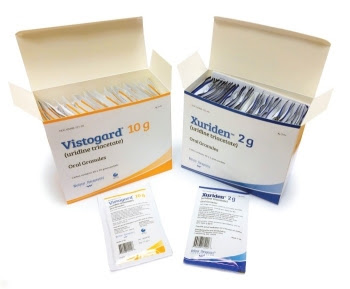BTG plc Announced FDA Approval Of VISTOGARD (Uridine Triacetate) As Antidote To Overdose And Early Onset, Severe, Or Life-Threatening Toxicities From Chemotherapy Drugs 5-Fluorouracil (5-FU) Or Capecitabine
BTG plc announced that the United States Food and Drug Administration (FDA) has approved Wellstat Therapeutics’ VISTOGARD® (uridine triacetate) as the first and only drug to treat patients following an overdose of chemotherapy drugs 5-fluorouracil (5-FU) or capecitabine, or in patients exhibiting early-onset, severe or life-threatening toxicity affecting the cardiac or central nervous system, and/or early-onset, unusually severe adverse reactions (e.g., gastrointestinal toxicity and/or neutropenia) within 96 hours following the end of 5-FU or capecitabine administration. VISTOGARD received approval following a priority review by the FDA.
Potentially life-threating or lethal toxicity from 5-FU can occur if the drug has been administered at a dose or rate greater than intended, or when a patient has genetic variations, impaired clearance or other factors that increase susceptibility to the toxicities of the drug. In combination with other drugs or radiation, 5-FU is a mainstay of chemotherapy across a variety of solid tumors, including those of the colon, pancreas, stomach, esophagus, breast, and head and neck. Capecitabine is an orally administered chemotherapy prodrug of 5-FU that is transformed into 5-FU within the body.
Principal investigator of the VISTOGARD clinical development program, Wen Wee Ma, MD, Associate Professor of Oncology, GI Cancers & Drug Development Program, Roswell Park Cancer Institute, commented: “Severe 5-FU toxicity has, historically, been difficult to treat and sometimes resulted in death for those affected. It is important to recognize the signs of severe 5-FU and capecitabine toxicity early, which often include unexpected side effects on the first cycle – including gastrointestinal toxicities such as mucositis, central nervous system toxicities such as altered mental state, hematologic toxicities, and even cardiotoxicity. The approval of VISTOGARD is important because it represents the first treatment with a demonstrated track record of efficacy and, just as important, it allows some patients to resume chemotherapy sooner following the resolution of the toxicity. VISTOGARD also has a very good safety profile.”
The FDA approval of VISTOGARD is based on data from a development program in 135 patients designed to demonstrate the efficacy and safety of a single course of 10 grams given orally every six hours for a total of 20 doses (patients in the studies had either received an overdose of 5-FU or capecitabine, or presented with severe or life-threatening toxicities within 96 hours following the end of 5-FU or capecitabine administration). In clinical studies, overall survival of patients with 5-FU toxicity receiving VISTOGARD was 96 percent, compared with 16 percent in historical cases employing standard supportive care measures. VISTOGARD also helped patients resume chemotherapy sooner, with 33 percent resuming their cancer treatment within 30 days.
VISTOGARD (uridine triacetate) is an orally administered drug approved by the FDA to treat patients following an overdose of 5-fluorouracil (5-FU) or capecitabine or in patients exhibiting early-onset, severe or life-threatening toxicity affecting the cardiac or central nervous system, and/or early-onset, unusually severe adverse reactions (e.g., gastrointestinal toxicity and/or neutropenia) within 96 hours following the end of 5-FU or capecitabine administration. VISTOGARD received orphan drug designation from the FDA as an antidote in the treatment of 5-FU poisoning and from the European Medicines Agency (EMA) as a treatment for 5-FU overdose. In Europe, under a named patient program, VISTOGARD is currently provided to patients at risk of excess 5-FU toxicity due to overdose and patients exhibiting severe toxicities to 5-FU within 96 hours of 5-FU administration.
5-FU is on the World Health Organization’s List of Essential Medicines, a compilation of the most important medications needed in a basic health system. Because 5-FU is administered in different doses and schedules as a frequent component of standard chemotherapy regimens for a variety of cancers, patients can experience dramatically different patterns of toxicity.
Used in combination with other chemotherapy agents and/or radiation, 5-FU has been for decades a mainstay of various treatment regimens for solid tumors, including those of the colon, pancreas, stomach, esophagus, breast, and head and neck. The drug is most commonly administered by infusion pump at or near what is considered the maximum tolerated dose. Expected side effects of 5-FU include myelosuppression (a reduction in white-blood-cell counts and thus increased risk of infection), diarrhea, nausea, vomiting, and mucositis (a painful inflammation and ulceration of the mucous membranes lining the digestive tract). Overexposure to 5-FU can lead to severe myelosuppression, gastrointestinal hemorrhage, septic shock, multiple organ failure, cardiac and neurological complications, and death.

Comments
Post a Comment